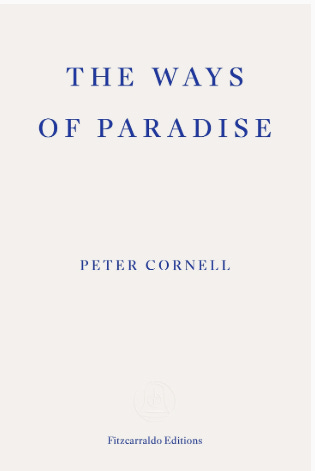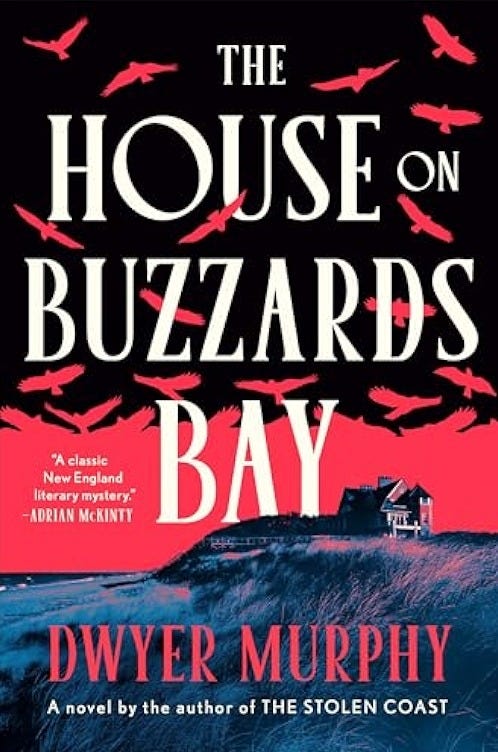A Critic’s Diary | June 2025
"Nadja" by André Breton, Cornell's "The Ways of Paradise," Ernard's "Zone," and what else I've been up to lately.
Nadja by André Breton
(Translated from the French by Mark Polizzotti, June 17, 2025. Originally published, 1928)
The surrealist landmark, inspired by true events, in a new translation from NYRB Classics. In it, Breton recounts his 10-day dalliance with Nadja, a captivating young woman that he met by chance on the streets of Paris. They do little more than kiss, mostly spending their time wandering about and exchanging gnomic observations about life, letting chance and circumstance guide them, looking for deeper meaning among the mundane coincidences the appear throughout our lives.
Breton—or, the narrator, André—is at first captivated by Nadja’s peculiar charm and easygoing, unencumbered manner, seeing her as a personification of his surrealist philosophy on life. The world seems to warp around her charisma, her “adorable mix of lightness and fervor.” He seems to hope (we’re told that “nadja” is the Russian word for hope—or the beginning of it, at least) that maybe through her, he can achieve a similar state of transcendence. “When I’m near her, I’m nearer to the things that are near her.”
But as he learns more about Nadja—her struggles, her past, her quotidian habits—he begins to lose interest. “I considered Nadja a free genius,” he writes, “like one of those ethereal spirits that certain magic practices allow you to engage with momentarily but that you could never subdue.” She is, in fact, a young, impoverished girl suffering from mental illness. When she becomes less of an idea to André and more of a fully rendered, three-dimensional person, he quickly makes his exit.
In a bratty, self-serving epilogue it is revealed that Nadja was subsequently institutionalized. André claims her fate is due to her daring to “not be entirely in conformity with the imbecilic code of good taste and good behavior.”
For me, the key to this text came in a scene where André has Nadja over to view his art collection, which includes, among other things, “a large, Guinean mask,” a “conical mask from New Britain island made of elderberry pith and reeds,” and a “fetish object” from Easter Island. Browsing the works, Nadja finds elements that resemble the symbols she sees in her imaginings.
What André sees in Nadja is what draws him to those works of primitivism—she is, in his perception, roughly hewn and simple, and seemingly in communion with an older, mystical way of being that sets her apart from the modern world. For André, she is another “fetish object.” He is trying to collect her, to use her as a device. But his perception of her is flawed; he projects his own expectations on her the same way he projects them onto those artifacts which, in the end, are just inert objects, not sources of magic. And when Nadja proves to be not merely an object but a person, he discards the truth of the person so as not to spoil the wonder of his misapprehension of her. He blames modernity (i.e. psychiatry and social conformity) for her fate.
I think Nadja is a real “you had to be there” text. Not a very pleasurable read and interesting mostly as a historical artifact rather than as a work of art. I do wonder what I would’ve thought of it had I read it when I was younger and perhaps more impressionable.
The Ways of Paradise by Peter Cornell
(Translated from the Swedish by Saskia Vogel. Fitzcarraldo Editions, March 2025. Originally published in 1987.)
I’m a sucker for a bit of metafiction. Peter Cornell’s The Ways of Paradise is a tricky little book, purporting to be the research notes of an obscure academic working on a grand manuscript that would supposedly reveal “a chain of connections until then overlooked.” Upon the researcher’s death, no manuscript was found, just pages and pages of disembodied notes referring to the lost text. As readers, we’re left to speculate as to what the thrust of the manuscript was with only the notes to guide us.
The references are wide ranging and learned, clustering around art history (particularly surrealism), literature, and architecture. André Breton and Nadja show up occasionally, which was a fun coincidence, as does the artist André Masson, whose painting Engloutissement (shown above) is a favorite of mine. Cornell’s academic researcher is preoccupied with spirals, labyrinths, hermeticism, and myth. Like Nadja, black and white photographs meant to augment the narrative are interspersed with the text. It’s probably trite to call what Cornell is doing “Borgesian,” but it is. The notes, taken as a whole, hint at some grand, occult revelation, though they could just as easily be the confused scribblings of a well-mannered, highly educated madman or misguided enthusiast.
A great little maze to get lost in for a short while.
Zone by Mathias Ernard
(Translated from the French by Charlotte Mandell; Fitzcarraldo Editions, 2014. Originally published in 2008.)
Mathias Ernard’s Zone, is book that, on paper, should be stressful and enervating, a relentless splatter-canvas of atrocity and trauma that I nonetheless found absorbing and, in some respects, meditative. When taken piece by piece, it appears turbulent and chaotic; but taken as a whole, it achieves a particular state of almost serene flow.
Zone is the first-person confession/travelogue of Francis Mirkovic, a French-Croatian man with a checkered past. In the present, Francis, a spy, is riding the train from Paris to Rome to deliver a career-ending dossier of secrets to a contact at the Vatican, after which he plans to disappear into a new, forged identity. Hopped up on amphetamines, he’s dogged by memories of his past as a volunteer solider in the Balkan Wars and the tragic failures of his past romantic entanglements.
Undergirding it all is a breathless chronicle of the violence that has consumed “the Zone,” the area around the Mediterranean where Mirkovic has plied his trade, a highly literate examination of bloody atrocities from Homer through the Holocaust into Palestine and beyond. Apart from a few brief interludes that purport to be from a novel Mirkovic is reading while he rides the train, the book is written entirely in one, unbroken sentence—though this isn’t daunting as it might sound. It has a rhythm that makes it easy to read and pretty soon you forget that the copious commas aren’t actually full stops.
…and I too, in a way, am an archaeologist, brush in hand I search through and probe vanished, buried things, to make them rise up from corpses, from skeletons, from fragments, debris stories copied out on coded tablets, my own Scripta Minoa, begun by the excavation of Harmon Gerbens the brutal alcoholic rapist in Garden City, and followed by thousands of names of killers and victims, painstakingly annotated, delineated like the charged pottery of Troy VII the mysterious burned city, indexed, classified, without my understanding the reason for my passion, like Schliemann or Evan’s, pushed always further into endless research, standing over the charnel pit of history, feet in the void:
How to describe such a book? How about this—What if Wikipedia were written like Finnegan’s Wake? You might balk at that description, but I mean it as a compliment. Zone is wild and unpredictable, but the net effect is hypnotic. It lulls you into its blurry stream of consciousness and batters you with its command of history and of literature, imposes on you with its frank brutality, and ultimately impresses with its vast scope. It reminded me, a bit, of Benjamin Labatut’s “Prussian Blue,” stretched out to novel length. (I wrote about Labatut’s blending of fact and fiction here.) The writing in Zone is beyond text; it’s hypertext, resembling the endless context switching and free-associative, interlinked pathfinding of internet research.
It’s a book about the horror of modernity that is steeped in modernism. Its furiously chaotic form matches the intensity and severity of its subject matter. And just when the relentless recitation of atrocities become numbing, Ernard begins to elaborate on Mirkovic’s life, a closely guarded secret through much of the book, bringing the character and his story to the fore, demonstrating how what we’ve been listening to, the historical digressions and literary flights of fancy have all been Francis’s efforts to blot out the deeply personal failings and regrets that he can’t bear to face.
Zone is quite old at this point, but Ernard has a new book out just this year from New Directions, The Deserters. Check out
’s review over at The Baffler or this one from .On stage
Over Memorial Day weekend, I went down to New York and caught three Broadway shows, all of which were on the less-than-traditional side of things.
Dead Outlaw is a stripped down, western-rock musical about Elmer McCurdy, a real life train robber whose body ended up as a mummy in a sideshow and bounced around from place to place for more than a half century. A very entertaining comedy though I can’t say any of the songs stood out as particularly memorable.
Pirates! resituates The Pirates of Penzance in New Orleans and garnishes Gilbert and Sullivan’s music with elements of blues and traditional jazz. (They knew well enough not to mess with “The Major-General Song” or “With Cat-Like Tread,” though.) It was a lot of fun and I think a smart way to showcase what’s great about Gilbert and Sullivan in a more accessible format for modern audiences—the new ending though, while well intentioned, felt rather abrupt and out of place.
Oh Mary! is like if I Love Lucy starred Mary Todd and Abraham Lincoln but Lucy was a histrionic narcissist and Ricky was a manipulative, closeted gay. An irreverent, not-too-deep, vulgar love letter to the theater.
In the discourse
Against my better judgement, I recently weighed in on a few topics that were driving the discourse on Substack. I’ll try not to make a habit of it.
Upcoming reviews
In June, for WBUR: The House on Buzzard’s Bay by Dwyer Murphy (Viking, June 24).
In July, for The Washington Post: Flashes of Brilliance: The Genius of Early Photography and How It Transformed Art, Science, and History by Anika Burgess (W.W. Norton, July 8).
In July, on Substack: Sakina’s Kiss by Vivek Shanbhag (McNally Editions, July 1)
In July, on Substack: Hard Margins by Edward J. Delaney (Turtle Point Press, July 15)
In July, on Substack: Vegas by John Gregory Dunne (McNally Editions, June 22)















Thanks for the Matthias Enard recc. I read "Tell Them of Battles, Kings, and Elephants" last year and adored it. Would love to read more from him.
I guess you've preempted my youthful reading of Nadja so now if I say it is a foundational text of my life and a true undersung classic I just sound like a sad pervert. But you're wrong*. Also, read Mad Love, which is a later book (this time he marries the subject, has a child, eventually divorces her) that connects to the earlier one in certain key ways. I hope to have a piece up on this soon, drawing on an interview with Pollizotti, who is not only a great translator but Breton's primary biographer in English. Perhaps it will change your mind a little.
*You are not wrong that Breton is using Nadja for his own purposes, just that you're wrong that the book is bad.